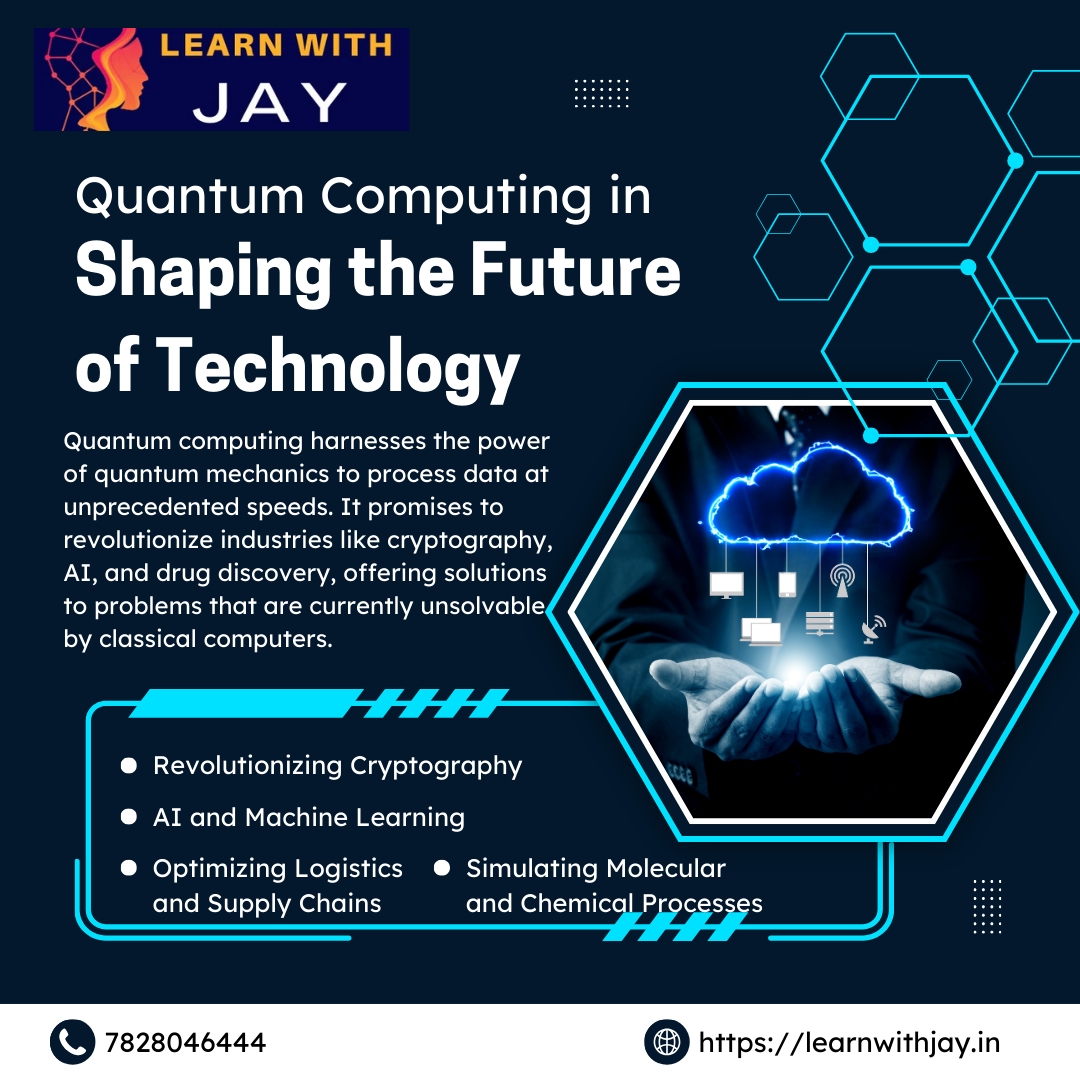In the rapidly evolving world of computing, few concepts have stirred as much excitement and curiosity as quantum computing. With the potential to revolutionize industries, solve problems previously thought unsolvable, and unlock new realms of possibilities, quantum computing stands at the threshold of transforming technology. In this article, we’ll explore how quantum computing will shape the future of technology, its key principles, applications, and the challenges that lie ahead.
Understanding Quantum Computing
At the heart of quantum computing lies the principles of quantum mechanics, a branch of physics that governs the behaviour of particles at the atomic and subatomic levels. Unlike classical computers, which use bits to represent data as either 0 or 1, quantum computers use quantum bits or qubits. These qubits have the unique ability to exist in multiple states simultaneously due to a property called superposition.
Additionally, qubits can be entangled, which means the state of one qubit is directly linked to the state of another, regardless of the distance between them. This phenomenon, known as quantum entanglement, allows quantum computers to perform complex calculations exponentially faster than classical computers in certain tasks.
The Technological Potential of Quantum Computing
1. Revolutionizing Cryptography
Cryptography is a crucial aspect of data security in the digital age. Classical encryption methods, such as RSA and AES, rely on the difficulty of factoring large numbers or solving complex mathematical problems. However, quantum computers have the potential to break many of these traditional encryption schemes in a fraction of the time. With their ability to perform massive parallel computations, quantum algorithms like Shor’s algorithm could efficiently factor large integers, rendering current cryptographic techniques vulnerable.
The future of cryptography lies in the development of quantum-safe encryption techniques. Researchers are already working on post-quantum cryptography algorithms that are resistant to quantum attacks, ensuring data security in a quantum-enabled world.
2. Advancing Artificial Intelligence (AI) and Machine Learning (ML)
Artificial Intelligence (AI) and Machine Learning (ML) are already transforming sectors like healthcare, finance, and marketing. However, many AI algorithms face limitations due to the computational power required to process large datasets and complex models.
Quantum computing has the potential to vastly enhance AI and ML. Quantum algorithms, such as quantum-enhanced optimization and quantum machine learning, can process and analyse data at speeds unimaginable for classical systems. For example, a quantum computer could help in accelerating training processes for deep learning models, discovering new patterns in vast datasets, or improving decision-making algorithms.
3. Simulating Molecular and Chemical Processes
One of the most exciting prospects of quantum computing is its ability to simulate quantum systems with high accuracy. Classical computers struggle to simulate complex molecular and chemical reactions because the number of variables increases exponentially as the system grows. For example, simulating the behaviour of molecules at the quantum level requires immense computational resources, which is practically impossible for classical systems.
Quantum computers can solve these problems more efficiently, enabling breakthroughs in drug discovery, materials science, and sustainable energy. Quantum simulations could allow scientists to design new materials with enhanced properties, develop more efficient solar cells, or create medications that are more effective with fewer side effects.
4. Optimizing Logistics and Supply Chains
Quantum computing can dramatically improve optimization problems, which are critical in logistics, manufacturing, and supply chain management. Problems like the traveling salesman, vehicle routing, and warehouse management often involve an enormous number of potential solutions. Classical computers can struggle to find the most efficient solutions within a reasonable timeframe, especially as the problem scale increases.
Quantum algorithms, such as the Quantum Approximate Optimization Algorithm (QAOA), could solve these problems exponentially faster. This capability could lead to more efficient resource allocation, reduced operational costs, and enhanced decision-making for businesses across industries.
5. Accelerating Financial Modelling and Risk Analysis
The financial industry heavily relies on complex mathematical models to predict market behaviour, assess risk, and manage investments. These models often involve large amounts of data and require intensive calculations. Quantum computing could help improve the accuracy and speed of financial modelling, enabling faster processing of market trends, better risk analysis, and optimized trading strategies.
Quantum algorithms can also improve Monte Carlo simulations, a technique used in risk assessment. By processing large datasets more efficiently, quantum computing could predict market fluctuations with greater precision, benefiting traders, investors, and policymakers.
Challenges and Limitations
While the promise of quantum computing is immense, there are significant hurdles to overcome before it can become a mainstream technology. Some of the key challenges include:
1. Hardware Limitations
Quantum computers require extremely low temperatures and highly controlled environments to function, making them complex and expensive to build and maintain. Current quantum computers have limited qubit coherence times, meaning that qubits lose their quantum state before completing calculations. Researchers are working to develop more stable qubits and scalable quantum systems to overcome these limitations.
2. Error Correction
Quantum systems are highly susceptible to noise and errors due to their sensitivity to environmental factors. Developing robust quantum error correction algorithms is critical to ensuring that quantum computers can reliably perform calculations. Without effective error correction, quantum computers will struggle to solve practical problems.
3. Programming and Algorithm Development
Programming quantum computers requires a fundamentally different approach compared to classical computers. Quantum algorithms are inherently more complex, and understanding how to leverage quantum principles for real-world applications is an ongoing challenge. As the field matures, new programming languages and frameworks will need to be developed to enable wider adoption of quantum computing.
The Road Ahead: Collaboration Between Classical and Quantum Systems
It’s important to note that quantum computing is not expected to replace classical computing. Instead, it will complement classical systems by tackling problems that are currently beyond the reach of classical computers. The future of technology will likely see hybrid systems, where classical computers work in tandem with quantum computers, each handling tasks suited to their strengths.
Major tech companies, such as IBM, Google, and Microsoft, as well as startups and academic institutions, are all actively investing in quantum computing research. The next decade will likely bring significant advancements in quantum hardware, algorithm development, and practical applications. As quantum computing continues to evolve, it holds the potential to reshape industries, drive scientific discovery, and solve some of the world’s most pressing challenges.
Conclusion
Quantum computing is poised to be one of the most transformative technologies of the 21st century. With its ability to solve complex problems faster than classical computers, it will accelerate advancements in fields ranging from cryptography and AI to chemistry and logistics. However, challenges such as hardware limitations, error correction, and programming remain. As these obstacles are overcome, quantum computing will unlock new capabilities, allowing humanity to explore the unknown and shape a future powered by unprecedented computational power.
While we are still in the early stages of quantum computing’s development, its potential to reshape the future of technology is undeniable. The quantum revolution has only just begun, and its impact will be felt across every sector, making it an exciting time for both researchers and technology enthusiasts alike.




The evolution of educational technology has opened up amazing opportunities for lifelong learning. Whether it’s interactive coding platforms or virtual science labs, these tools are making quality education more accessible to people of all ages and backgrounds. It’s democratizing knowledge in unprecedented ways.